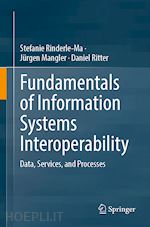
Se ordini entro 9 ore e 54 minuti, consegna garantita in 48 ore lavorative
scegliendo le spedizioni Express
Questo prodotto usufruisce delle SPEDIZIONI GRATIS
selezionando l'opzione Corriere Veloce in fase di ordine.
Pagabile anche con Carta della cultura giovani e del merito, 18App Bonus Cultura e Carta del Docente
This book presents fundamental concepts and technologies to tackle interoperability between information systems. It details interoperability at the data, service, and process level, and combines theoretical foundations with hands-on presentation of technologies to enable the development of sound and practical integration.
Chapter 1 details general interoperability challenges and describes the structure of the book. To start with, Chapter 2 presents technologies for the exchange of data between two selected and highly relevant data formats, i.e., relational databases and XML. Next, Chapter 3 explains concepts for schema matching and mapping and data integration as well as the technological basis for implementing them based on query and transformation languages like XPath and XSLT. Chapter 4 then turns to service interoperability and explains two related technologies – REST and GraphQL – in detail. In Chapter 5, fundamentals for designing process orchestrations at the conceptual level are presented, focusing on how to model process orchestrations and how to verify their correctness and soundness, and showing BPMN as the de facto modeling standard. Chapter 6 then details the concepts and languages for the implementation of process orchestrations, including the presentation of execution languages for process orchestrations that are equipped with a formal semantics, e.g., Workflow Nets, the Refined Process Structure Tree, and CPEE Trees. Subsequently, Chapter 7 focuses on the growing number of distributed, loosely coupled, and often non-interoperable applications through the concepts of enterprise application integration and explains these by an implementation in CPN Tools and by two case studies. Eventually, Chapter 8 is lifting the orchestration and integration concepts and technologies to the choreography level by dealing with the interoperability between different process orchestrations. Chapter 9 concludes the book by featuring success factors for interoperability projects. It also provides a range of open research directions for interoperability such as compliance, sensor fusion, and blockchain technologies.
The book is mainly intended as a textbook to be used for developing and teaching courses on interoperability and integration. To this end, it is accompanied by a Web site with additional teaching materials. It also spans a bridge from researchers to graduate students and practitioners by providing a deep understanding on practical interoperability challenges and solutions. The focus here is put on de facto standards and open-source systems and tools to enable interoperability solutions at low cost.
Jürgen Mangler holds a PhD in Business Informatics from the University of Vienna and works as senior postdoc at the Technical University of Munich, Germany. He is chief developer of the open-source process execution engine CPEE. Juergen has gained deep insightsinto interoperability concepts and their realizations during several research projects such as the EU FP7 project ADVENTURE and the Austrian Center of Digital Production. The latter dealt with challenges in the vertical and horizontal integration of data, machines, systems, and humans. Juergen has taught various software engineering related topics since 2004.
Daniel Ritter holds a PhD in Computer Science from the University of Vienna and works as central database architect at SAP SE for SAP HANA Cloud and OrientDB. He is a postdoctoral researcher in the SAP HANA Research Campus and from 2021 to 2022, he was a postdoctoral research fellow at the University of Potsdam, where he led the Autonomous Data Managament group at the Hasso Plattner Institute. He has 20+ years of experience in large-scale software development projects and was a central architect of SAP's Cloud Integration solution.











Il sito utilizza cookie ed altri strumenti di tracciamento che raccolgono informazioni dal dispositivo dell’utente. Oltre ai cookie tecnici ed analitici aggregati, strettamente necessari per il funzionamento di questo sito web, previo consenso dell’utente possono essere installati cookie di profilazione e marketing e cookie dei social media. Cliccando su “Accetto tutti i cookie” saranno attivate tutte le categorie di cookie. Per accettare solo deterninate categorie di cookie, cliccare invece su “Impostazioni cookie”. Chiudendo il banner o continuando a navigare saranno installati solo cookie tecnici. Per maggiori dettagli, consultare la Cookie Policy.